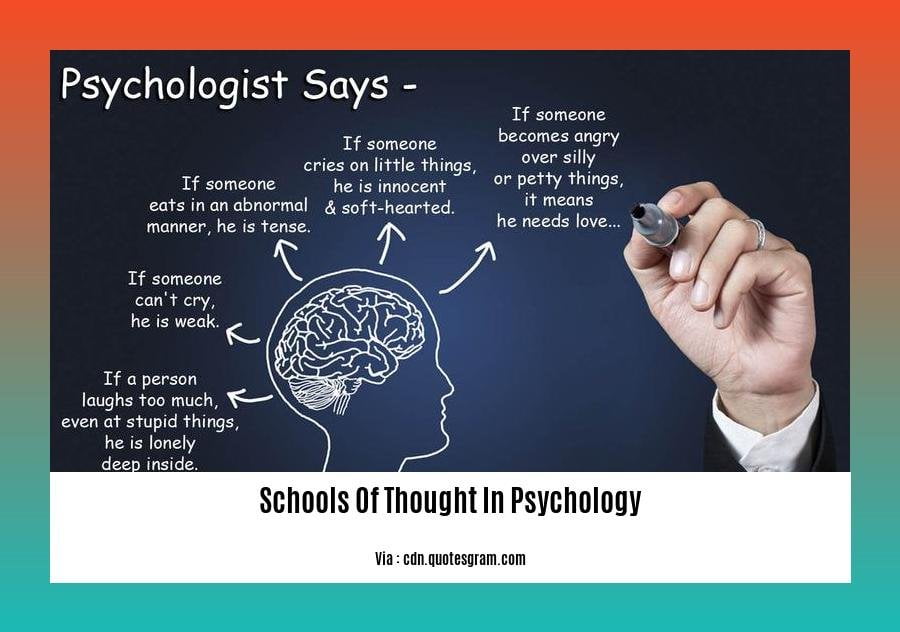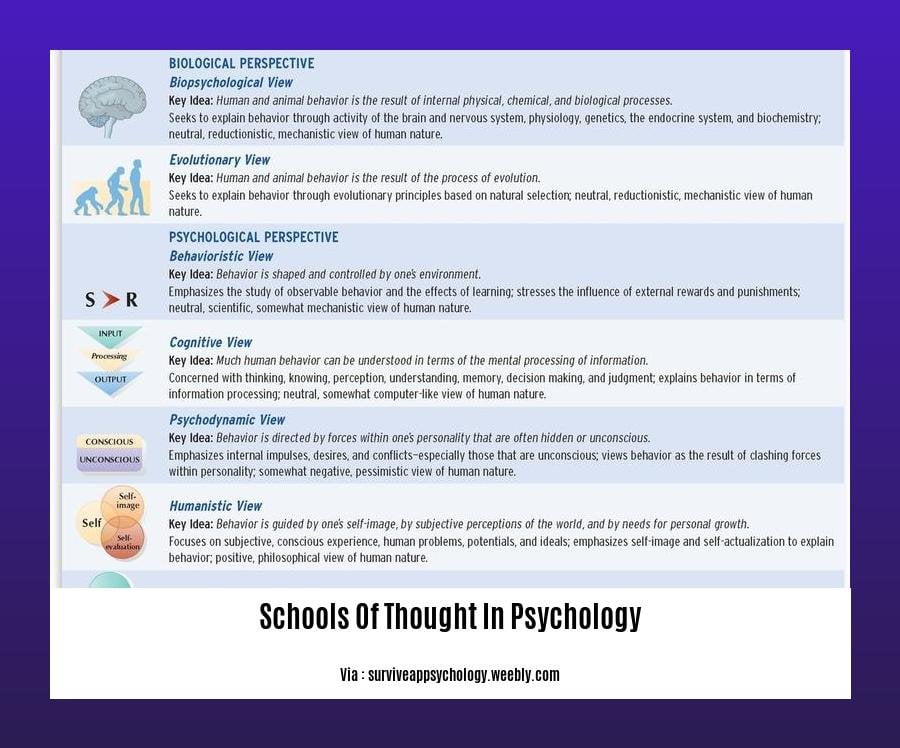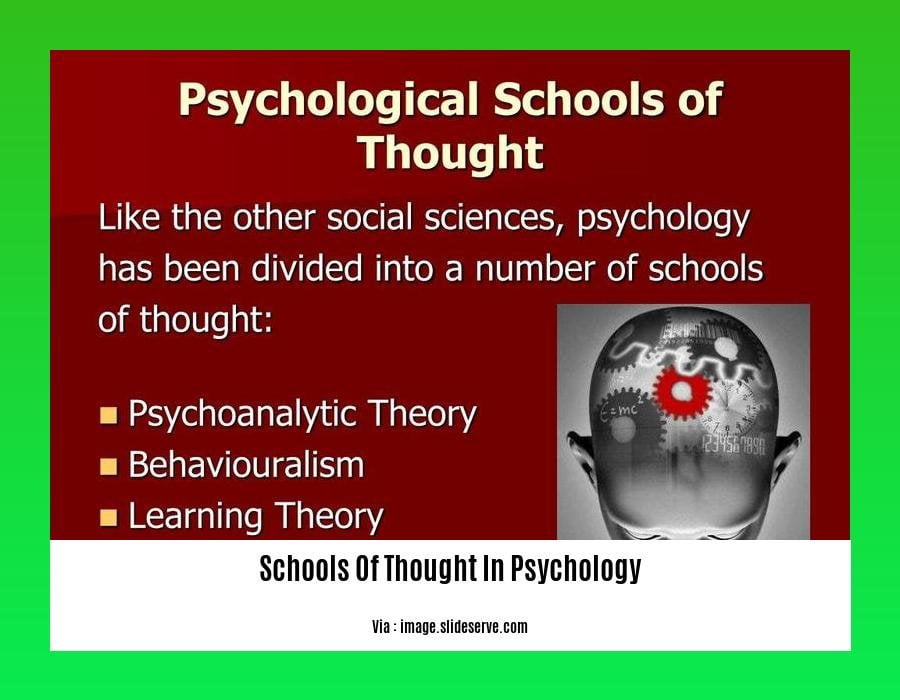Delve into the fascinating world of psychology with our exploration of the diverse schools of thought that shape our understanding of the human mind. From the objective observations of behaviorism to the subjective experiences emphasized by humanism, we’ll uncover the key tenets, historical evolution, and empirical support for each major theoretical framework. Join us on this journey as we unlock the complexities of human behavior through the lens of psychology’s diverse perspectives: Schools of Thought in Psychology: An Exploration of Diverse Perspectives.
Key Takeaways:
- Structuralism: Analyzes consciousness’s basic elements and organization.
- Functionalism: Examines mental processes’ function and purpose in adapting to the environment.
- Gestalt: Emphasizes holistic perception rather than breaking experiences into parts.
- Behaviorism: Studies observable behaviors and their relation to stimuli and reinforcement.
- Psychoanalysis: Explores the unconscious mind’s influence on personality and behavior.
- Humanism: Highlights growth, free will, and self-actualization.
- Cognitive: Studies mental processes like thinking, learning, memory, and problem-solving.
Schools of Thought in Psychology

Understanding the human mind and behavior is a complex endeavor, tackled by psychology through various schools of thought. Each school offers a unique lens to examine our psyche.
Psychoanalysis
Much like an iceberg, psychoanalysis delves into the unconscious mind, exploring its impact on our actions. It believes early experiences shape our personality.
Behaviorism
Behaviorism keeps its focus on observable behaviors, emphasizing how we learn from our environment. It sees reinforcement as the key driver of our actions.
Humanism
Humanism places the individual front and center, recognizing our potential for growth and self-actualization. It believes we have the agency to shape our destiny.
Cognitive Psychology
Thinking, memory, and problem-solving are the domain of cognitive psychology. It examines the mental processes that shape our understanding of the world.
Social Psychology
Social psychology explores how we behave in groups, shedding light on conformity, obedience, and prejudice. It unravels the intricacies of social interactions.
These schools of thought in psychology provide diverse pathways to understanding the human experience. Each offers insights, strengths, and limitations, contributing to our ever-evolving knowledge of the mind and behavior.
Delve into the captivating history of psychology, tracing its fascinating evolution from ancient origins to modern-day advancements. Discover the contributions of iconic psychologists throughout the centuries by exploring our profiles of renowned famous psychologists. For a comprehensive understanding of the diverse perspectives in the field, explore our extensive coverage of major theories in psychology.
Humanism: Stresses subjective experience and personal growth

Humanism: A Holistic Approach
Humanism is a school of psychology that emphasizes the importance of the subjective experience of the individual. Humanists believe that people are more than the sum of their parts and that they have the potential for growth and self-actualization. They focus on the whole person, taking into account their thoughts, feelings, and behaviors.
Key Points of Humanism:
- Holistic Perspective: Humanists believe that people are complex beings and that to understand them, we need to look at them as a whole.
- Emphasis on Growth: Humanists believe that people have the potential to grow and change throughout their lives.
- Free Will: Humanists believe that people have free will and are responsible for their own choices.
- Subjectivity: Humanists believe that people’s experiences are subjective and that there is no one right way to view the world.
Key Figures of Humanism:
- Abraham Maslow: Developed the hierarchy of human needs, which outlines the different levels of needs that people have.
- Carl Rogers: Developed client-centered therapy, which focuses on the client’s own self-exploration and growth.
Criticisms of Humanism:
- Lack of Scientific Methodology: Humanism has been criticized for its lack of scientific methodology. Humanists often rely on subjective methods, such as interviews and observation, to collect data.
- Ethnocentric: Humanism has been criticized for being ethnocentric. It is based on the values and beliefs of Western culture and may not be applicable to other cultures.
Despite these criticisms, Humanism remains a popular school of psychology. It offers a unique perspective on the human experience and has helped many people to live more fulfilling lives.
Key Takeaways:
- Humanism emphasizes the importance of the subjective experience of the individual.
- Humanists believe that people are more than the sum of their parts and that they have the potential for growth and self-actualization.
- Humanism has been criticized for its lack of scientific methodology and for being ethnocentric.
Citation:
- Humanistic Approach in Psychology (humanism): Definition & Examples:
Cognitive Psychology: Explores Mental Processes Like Thinking and Memory
Cognitive psychology, a prominent school of thought in psychology, delves into the intricate workings of our minds. It unravels the mysteries of mental processes such as thinking, memory, attention, language, problem-solving, and learning. By understanding these processes, cognitive psychologists aim to shed light on how we acquire, store, retrieve, and use information.
This field of psychology has garnered immense attention since the 1950s and 1970s, revolutionizing our comprehension of the mind’s remarkable abilities. Cognitive psychologists approach the study of the mind as an intricate information processor, constantly receiving, interpreting, and responding to stimuli from our environment.
Through meticulous research, cognitive psychology has led to groundbreaking discoveries, enhancing our understanding of how we perceive and process the world around us. Its insights have far-reaching implications, extending to fields like healthcare and education, where they have facilitated the development of effective interventions and teaching methods.
Key Takeaways:
- Cognitive psychology explores the mental processes that underpin our thoughts, memories, and actions.
- It investigates how we perceive, interpret, and respond to environmental stimuli.
- Cognitive psychology has revolutionized our understanding of the mind and its functions.
- Its insights have practical applications in diverse fields, including healthcare and education.
Source:
- Verywell Mind: Cognitive Psychology: The Science of How We Think
Social Psychology: Investigates social influences on behavior
You often wonder why you behave the way you do. Psychology, the scientific study of behavior and mental processes, delves into the intricate workings of our minds. Within this field, various schools of thought have emerged, offering diverse lenses through which we can understand our social interactions. Let’s unravel some of them!
Psychoanalysis:
This school views our unconscious mind as a driving force behind our behavior. Think of it like an iceberg – the visible part, our conscious thoughts and actions, is just the tip. According to psychoanalysis, the submerged part, our unconscious drives and conflicts, shapes our behavior in ways we may not realize.
Behaviorism:
Behaviorists believe our actions are primarily shaped by our environment. Just like a dog can be trained to sit on command, our behaviors are learned through reinforcement and punishment. By understanding these mechanisms, we can change our actions.
Humanism:
This school places the individual at the center. Humanists believe we all have the potential for personal growth and self-fulfillment. Humanism emphasizes our subjective experiences and the importance of free will in shaping our destiny.
Cognitive Psychology:
Our thoughts, memories, and problem-solving abilities are the focus of cognitive psychology. It’s like a journey into the labyrinth of our minds, exploring how we process and use information.
Social Psychology:
Here’s where the spotlight falls on our social influences. Social psychology investigates how our thoughts, feelings, and behaviors are shaped by our interactions with others. Whether it’s the subtle cues we pick up from body language or the impact of cultural norms on our beliefs, social psychology unravels the intricate dance of human connections.
Key Takeaways:
- Psychology offers a range of perspectives on human behavior, each with its unique strengths and limitations.
- Social psychology explores the impact of social interactions on our thoughts, feelings, and actions.
- Schools of thought provide frameworks for understanding the complexities of human behavior.
Citation:
- Simply Psychology: Definition of Social Psychology
FAQ
Q1: What is the main difference between structuralism and functionalism?
A1: Structuralism focuses on the basic elements of consciousness, while functionalism examines the function and purpose of mental processes in adapting to the environment.
Q2: How does psychoanalysis differ from behaviorism?
A2: Psychoanalysis explores the unconscious mind and its influence on personality and behavior, while behaviorism investigates observable behaviors and their relationship to stimuli and reinforcement.
Q3: What are the key tenets of humanistic psychology?
A3: Humanistic psychology emphasizes the uniqueness of each individual, the importance of understanding the whole person, and the capacity for growth, free will, and self-actualization.
Q4: What is cognitive psychology?
A4: Cognitive psychology studies internal mental processes, including perception, thinking, memory, attention, language, problem-solving, and learning.
Q5: What are some important concepts in social psychology?
A5: Social psychology explores interactions between individuals and the influence of social situations, including social norms, culture, cognitive biases, and the actor-observer bias.
- China II Review: Delicious Food & Speedy Service - April 17, 2025
- Understand Virginia’s Flag: History & Debate - April 17, 2025
- Explore Long Island’s Map: Unique Regions & Insights - April 17, 2025
















